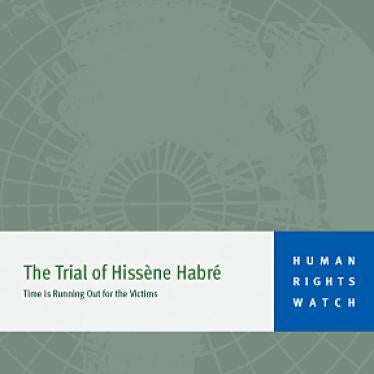(Brussels) – Prosecutors in Europe are using the concept of universal jurisdiction to pursue foreign war criminals in national courts, a strategy that is gaining momentum across the continent and should be expanded, Human Rights Watch said in a report released today. The theory is that some crimes are so horrendous that they should be tried regardless of the geography of victims and perpetrators.
“Opponents have proclaimed the death of universal jurisdiction, but in fact it’s alive and well in Europe,” said Richard Dicker, director of the International Justice Program at Human Rights Watch. “This principle is a vital weapon in winning justice for the victims of the world’s worst atrocities.”
In the 101-page report released today, “Universal Jurisdiction: The State of the Art,” Human Rights Watch looks beyond shrill debates about the concept and examines how it is working in practice. Based on interviews with judges, investigators, lawyers and officials in eight European countries, the report describes how some governments, including Britain, Denmark, Norway and the Netherlands, have created special war crimes units to conduct investigations across the globe.
Universal jurisdiction is the power of a national court to try genocide, war crimes, crimes against humanity or torture – even if neither the suspect nor the victim are nationals of the country where the court is located, and the crime took place outside that country. It was most famously utilized in the 1998 arrest of former Chilean dictator Augusto Pinochet on torture charges in London at the request of a Spanish court.
Opponents of universal jurisdiction, including the Bush administration, claim that it is a dangerous political tool that will be misused against American officials and service personnel. However, the report shows that universal jurisdiction is first and foremost an effective road to justice for victims who have nowhere else to go.
Recent cases successfully prosecuted in Europe include: two Afghan military officers convicted in the Netherlands of war crimes committed in Afghanistan; an Argentine officer convicted by a Spanish court of crimes against humanity in Argentina; and Rwandan businessmen convicted before a Brussels court of participating in the Rwandan genocide.
In its analysis of Belgium, Denmark, France, Germany, the Netherlands, Norway, Spain and the U.K., the report reveals which national authorities are meeting the challenges of prosecuting war criminals who committed crimes in other countries, and which need to do more to ensure that their countries do not become safe havens for war criminals.
“Accused war criminals should realize that the arm of justice has gotten longer,” said Dicker. “Governments like those in the Netherlands and Britain have made a real effort to prosecute suspected war criminals. But more needs to be done; countries like Germany and France are lagging behind in the fight to give victims their day in court.”





